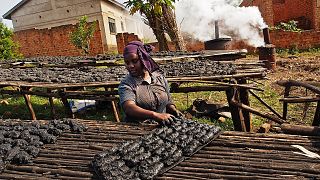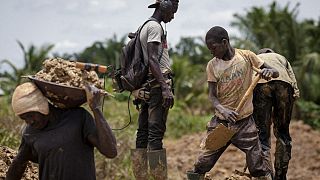Uganda
In the central region of Uganda, wheel loaders are busy loading trucks with sand.
Sand at the Seroma mining company quarry comes from the Lwera wetland, an area near Lake Victoria that is a key ecosystem.
It is a breeding ground for fish, serves as a stop for migratory birds and can store vast amounts of planet-warming carbon dioxide underground.
The wetland stretches more than 20 kilometres (12 miles) astride the highway from the Ugandan capital Kampala.
Back to the mining site, nearby trucks line up, waiting to be loaded with sand.
Excavators dig as all are motivated by demand from the construction industry, made worse because of the coarse texture of the sand from the wetland that's said to perform better in brickwork mortar.
Now, all known corporate operations within the wetland have the authorisation to be there, giving them a measure of legitimacy that’s frustrating environmental activists, local officials and others who say the mining activities must be stopped because they degrade the wetland.
They charge that while the companies are there legally, their activities are in many ways "unlawful."
Locals in Lwera's farming community say they reap misery, complaining that mining creates few jobs and ruins the land.
A company operating in Lwera defends its work and record.
"They (authorities) give you the area that you are going to mine, and they also show you how you are supposed to do restoration because, at the end of the day, you are not supposed to leave a lake where you have mined," Wahab Ssegane an operations manager at Seroma Ltd assures.
"You are not supposed to go so deep because when you go so deep, you will instead leave a lake."
One key concern relates to the equipment used.
Companies are permitted to dig four metres (13 feet) into the earth, but some dredging vessels are retrofitted at site to be able to dig deeper, according to some officials at the scene.
NEMA has banned dredging within Lake Victoria but permits sand mining in the wetlands.
"I put the blame on NEMA because they give licenses to work in swampy areas to make it legal for works to be done in swampy areas where NEMA would be protecting such environments," mayor Charles Tamale, charges.
"Now, you find local councils like Lukaya local council, (which) cannot stop these guys because they have all their documents putting them in the area to do the work."
"It is not true that they are above the law and some of them have permission to do what they do," says Naomi Karekaho, corporate communications manager, National Environment Management Authority (NEMA).
"Uganda needs sand and every effort is being made to ensure that the sand is being mined in a sustainable manner. If there are any illegalities, I have mentioned earlier that we have an expressed penalty scheme that charges money in billions of Uganda shillings if you are found to be degrading the environment."
Occasional floods
In the meantime, residents say they suffer the consequences of sand mining.
"Water that used to flow through the river started spilling over to people's houses, forcing residents to leave their homes and some houses also collapsed."
"Some residents have moved to the Kamalirwa, others are in Lukaya and others are at the Lakeshore all because of water, gardens are gone and our environment has been destroyed because of the sand mining," Sandra Buganzi tells.
Because pits are not refilled, the open spaces naturally fill up with water that then spreads, occasionally flooding people’s gardens and homes, says resident Sandra Buganzi.
Sand mining is a big business, with 50 billion tons used globally each year, the United Nations Environment Programme said in a report last year.
It warned that the industry is "largely ungoverned,” leading to erosion, flooding, saltier aquifers and the collapse of coastal defences.
Healthy wetlands can help control local climate and flood risk, according to UNEP.












01:26
Brazil elephant sanctuary welcomes its newest resident, rescued from a zoo in Argentina
01:13
Uganda reopens border with M23-held eastern DRC
02:05
In Zimbabwe, metal scrap collecting is reducing environmental pollution
01:00
Pix of the Day: July 3, 2025
01:45
From Uganda to NYC: Zohran Mamdani's rise in American politics
01:22
Ugandan-born Zohran Mamdani declares victory in New York Democratic mayoral primary